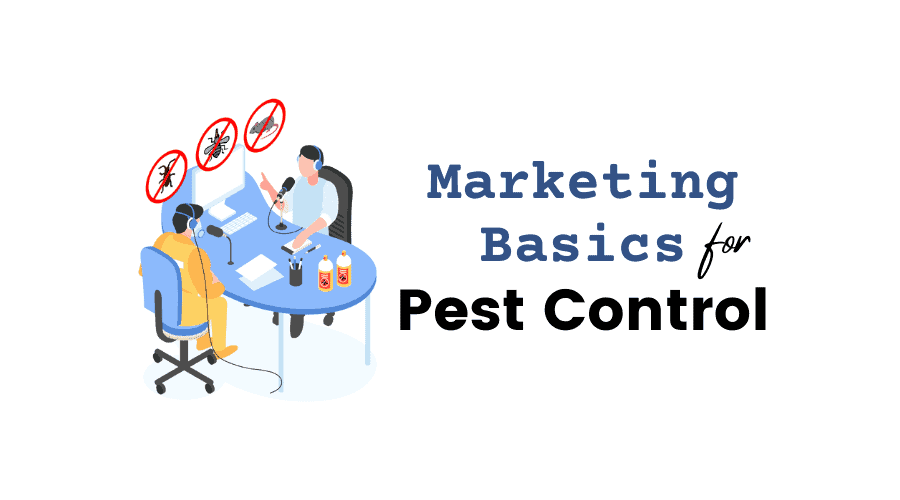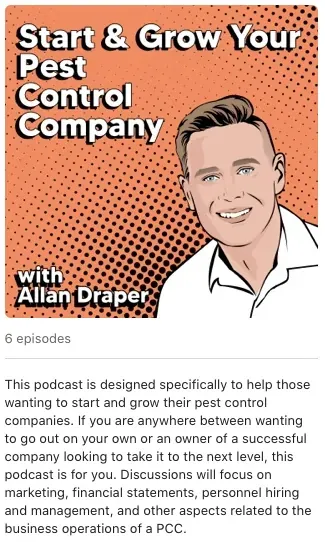September 7, 2020
Pest Control Marketing Basics [Follow Up]

I was interviewed on a podcast recently called Start and Grow Your Pest Control Company with Allan Draper. I really look up to him as a business owner and person in general.
It was a fun way to share some basic tips on marketing for pest control
companies. Even though these are things I could talk about for hours, this condensed format forced me to be as concise as possible and work through my thoughts on the subjects. Marketing is a mix between creative process and scientific method.

Design, colors, copy, and methods are all on the table and up for debate. Once you find something that works, the key is honing in on it more to increase results as well as recording the things that you believe made it successful in the first place.
Today I’ll go over some of the same questions with more thorough explanations and provide resources for pest control owners. Contact me directly on facebook
or through this site if you have any questions.
Basic Online Marketing Definitions
- Digital marketing– Any advertising or marketing that is done online. This could be through social media, search engines, or other channels to promote your business.
- SEO– “Search Engine Optimization”. Although there are hundreds of factors to it, in general, it’s the process of making your website easier for search engines to read, along with performing actions to improve the authority and trust of your brand and site.
- PPC– “Pay Per Click”- most of the time this is associated with Google Ads, though it could be any platform that charges each time a user clicks on your listing or ad.
- CPC– “Cost Per Click”- Another metric that helps you understand how much you’re actually spending each time your listing is clicked on.
- CTR– “Click Through Rate”- Out of the number of times your listing was SEEN, your click through rate is the amount of ACTUAL CLICKS it got. So if your listing was seen 100 times and received 10 clicks, your CTR would be 10%. I’ve worked with lots of pest control companies and typically a decent click through rate would be around 5%.
- ROI– “Return on Investment” – Everyone is familiar with this, but remember that there are nuances. You should track total ROI, and then break down more specific instances of ROI, like return on ad spend or return on SEO, etc. Every dollar you spend should be in the context of somehow working to create a more profitable company.
- Impressions– The total amount of times your listing or ad was seen. So for example, if someone saw your listing on Google and clicked or continued scrolling, that’s an impression either way. Impressions tend to be very high and the amount of clicks tend to be fairly low in comparison. The numbers can be a bit frustrating, but once you understand your baseline, it’s much easier to see growth and be able to put it in the proper comparative context.
- Bounce Rate– Bounce Rate refers to when someone comes to your site and then “bounces”, or leaves. You want a low bounce rate, meaning the user clicked on your listing and found what they were looking for. In internet marketing nerd talk, we would say that “your site satisfied the user intent”. Understanding what drives people to your site and then what keeps them there is crucial.
Which Pest Control Companies Should be Marketing?
Whether your budget is $1 or $10,000, you should be marketing online and offline. There’s no excuse. Even a brand new startup pest control company can do dozens of things that are either low or no cost options for growing their company. I’ll provide a list later on of things you can do even if you’re just getting started on a shoestring budget.
What Should We Think of Yelp, Home Advisor, Thumbtack, etc.?
We’ve all heard plenty of anecdotes of the good, and especially the bad, of using these platforms to grow your PCC. However, your region, your personality, and your goals will affect how well these will perform for you. I think there is a place for these as long as you have the proper expectations and the time to dedicate.
If you’re casually interested in using HomeAdvisor, for instance, you may miss calls that you’re still charged for, and the contract value may not be as high as you thought. This would create a poor perception in your mind about the platform in general. When these perceptions spread on facebook groups and other places, it creates a false, blanket attitude toward different marketing mediums.
I’ve seen owners say that SEO “doesn’t work” or that it’s a scam. Meanwhile, companies out there are making millions from it! The point here is that if you’re taking something somebody said and applying it to your situation, you better have a lot of trust in that person, or the data to back it up.
Now, regarding Yelp:

They are probably the single biggest target of our industry’s ire, and in many cases, it’s well deserved. However, in my opinion they’re simply too big and too important to ignore altogether.
For this reason I created a quick
pest control guide to Yelp
that may help you navigate the platform without pulling your hair out. It’s worth the read.
Should a Pest Control Company be Focusing on Social Media?
As it regards to “organic” posting, no, it shouldn’t be a major focus. The key is to show an online pulse, so that if someone is researching your company they see that you’re active and legitimate. However, this could be done comfortably once per month and be enough. Unless you have a unique strategy that has been paying off, this isn’t an activity that will directly lead to ROI on your time.

This is separate from paying to run ads on social media, which can be very effective. The difference is that with ads, you’re targeting people who don’t already correspond with your company (someone who already follows your page or is a friend of someone who does).
Right now, of all the different platforms, Facebook seems to be the biggest bang for your buck. Google ads are getting more expensive, Twitter and TikTok doesn’t seem to be the audience, Instagram hasn’t shown to be good with “intent deviation”.
When Should I Hire Someone For SEO? And How Much $$$?
Everyone has a different threshold and timing for when they’re comfortable throwing money in the online marketing game, but one thing is sure: don’t make the mistake of hiring the cheapest dude (or company). The effect could be disastrous. Even if they begin strongly, if they’re not using long-term principles and only manipulating the search engines, it could be a catastrophic collapse later on.
And that would HURT.
I personally know a company that made some very poor SEO decisions, and I calculated at least 1.2 million dollars lost because of it. Ouch.
As a rule of thumb, until you can pay at least $1000 per month, I wouldn’t throw money into SEO as a new pcc owner. I would also ensure that they can coherently explain their strategies to you. I have nothing against those offering SEO from foreign countries, and in some cases they are the bomb, but you’re playing with fire if there is any kind of language barrier.
I’m always game to chat SEO and marketing, or if you just need me to check up on what your marketing guy is doing (sneaky sneaky), I’m totally down for that as well.
How to Track ROI?
You need to have a system for attributing leads to their given source (I wrote a
post on this
a while back). The most sure way to accomplish this requires no software- just ask every customer how they found you and make sure to mark it down within your CRM. If you can accurately account for every customer source, you can make educated decisions about where to put your focus on in the future.
If you’ve found that paying for leads with AngiesList was a lower acquisition cost than you thought, you might up your budget there and decrease it somewhere else.
How To Start SEO on Your Own
Many pest control owners don’t come into this with tons of cash. If that’s the case for you, here are a few things you can do yourself that will get the ball rolling for free.
Claim or Create your Google My Business Listing
If you’ve been in business for a while, Google may already have a listing set up, in which case you’ll just need to search for it and hit “claim this business”. Google will send you a verification number to the address listed and when you punch in that code (usually takes 5-7 days to arrive), you’re golden.
Fill it in completely, if they allow 750 words for your description, use as much of it as you can. As you go into the different services, Google will pick up the keywords and be more likely to show your listing to searchers.
Get Reviews
I can’t stress this enough. I did a study on the top 100 cities in the USA for pest control searches. The median top listing in the map section had 27 reviews, the second was 25, and third was 18. This is really not that high of a bar to clear, especially if you provide a great service and ask for reviews. Most satisfied customers are happy to provide feedback.
Google also makes it easy to shoot over a short link that will prompt them to sign in and leave a review.
Build a Profile on Prominent Sites
- Local listings and Directories- Chamber of Commerce, Local Sites
- Industry Directories & Review Platforms- Yelp, HomeAdvisor, Expertise, AngiesList, Thumbtack, ThreeBestRated, Porch, etc.
- Social Media- Facebook, Twitter, Insta, etc.
Make sure to fill these out as completely as possible, add real photos, and link back to your website. This establishes trust with Google and it will recognize you as one “entity”.
Reach out to me if you have any questions related to online marketing, happy to set up a call.












